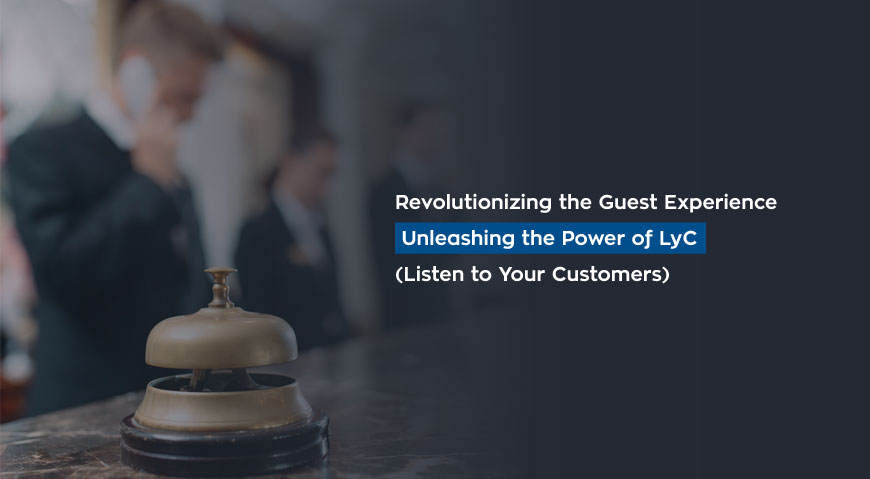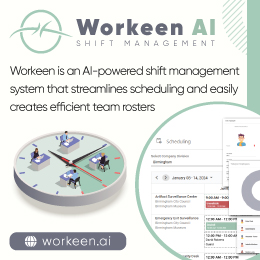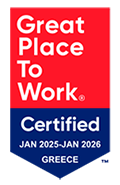- Posted by: blignos
- Published: 20-02-2024
- Category: Latest news
Revolutionizing the Guest Experience: Unleashing the Power of LyC (Listen to Your Customers)
Welcome to the future of hospitality! In an era where customer experience reigns supreme, it's time for hotels to embrace a game-changing approach: LyC (Listen to Your Customers). Through this revolutionary concept, hotels can unlock the true potential of guest satisfaction, fostering loyalty and driving business growth like never before.
In this article, we will delve into the power of LyC, exploring how it can elevate the guest experience to new heights. By truly listening to your customers, you can uncover invaluable insights, gain a deeper understanding of their needs, and tailor your offerings accordingly. Gone are the days of generic solutions; LyC enables hotels to provide personalized experiences that leave a lasting impression.
But how can LyC be implemented effectively? We will explore practical strategies, such as leveraging data analytics, gathering feedback through surveys, and empowering staff to be customer-centric. By embracing LyC, hotels can create memorable experiences, win over customers, and stay ahead of the competition in this increasingly digitized world. Get ready to revolutionize your guest experience with the power of LyC!
The Importance of the Guest Experience in the Hospitality Industry
In today's highly competitive hospitality industry, providing an exceptional guest experience is paramount. Guests have more options than ever before, and their expectations are constantly evolving. A positive guest experience not only leads to customer satisfaction but also builds loyalty and generates positive word-of-mouth, which can significantly impact a hotel's reputation and bottom line.
A study conducted by Harvard Business Review found that customers who had the best experiences spent 140% more than those who had the poorest experiences. This highlights the immense potential for revenue growth when hotels prioritize the guest experience. Moreover, a satisfied guest is more likely to become a repeat customer, reducing customer acquisition costs and increasing the lifetime value of each guest.
To truly stand out in the crowded hospitality landscape, hotels must go beyond providing basic amenities and good service. They must strive to create a memorable and personalized experience that exceeds guest expectations at every touchpoint. This is where LyC comes into play, enabling hotels to tap into the desires and preferences of their guests in order to deliver a truly exceptional experience.
What is LyC (Listen to Your Customers)?
LyC, short for Listen to Your Customers, is a customer-centric approach that emphasizes the importance of actively listening to and understanding the needs and desires of guests. It goes beyond just gathering feedback and aims to create a culture of continuous improvement and innovation based on customer insights.
At its core, LyC involves collecting and analyzing data from guests’ to gain a holistic understanding of the guest journey. This can include feedback from online reviews, reporting of any missing or broken items, and even direct room service requests in easily accessible mobile app. By leveraging technology and data analytics, hotels can uncover patterns, identify trends, and gain actionable insights that drive informed decision-making and help shape the guest experience.
LyC is not a one-time initiative but an ongoing process that requires a commitment from the entire organization. It involves creating a feedback loop where customer insights are shared, analyzed, and acted upon, ensuring that the guest experience is continuously improved and tailored to meet evolving expectations.
The Benefits of Implementing LyC in Your Business
Implementing LyC in your hotel can bring a multitude of benefits that directly impact guest satisfaction, loyalty, and revenue growth. Let's explore some of the key advantages of embracing LyC:
- 1 Personalized experiences: One of the major benefits of LyC is the ability to provide personalized experiences to guests. By listening to your customers, you can gain insights into their preferences, interests, and needs, allowing you to tailor your offerings accordingly.
- 2 Enhanced guest satisfaction: By actively listening to your customers and addressing their needs, you can significantly enhance guest satisfaction. When guests feel heard and valued, they are more likely to have a positive perception of your hotel and are more likely to return in the future. Moreover, satisfied guests are more likely to leave positive reviews and recommend your hotel to others, further boosting your reputation and attracting new customers.
- 3 Increased customer loyalty: Customer loyalty is crucial in the hospitality industry, as it leads to repeat business and higher customer lifetime value. LyC helps foster customer loyalty by building strong relationships with guests. By understanding their preferences and providing personalized experiences, you can create a sense of loyalty and make guests feel like valued individuals rather than just another customer. This emotional connection with your brand can result in long-term loyalty and advocacy.
- 4 Competitive advantage: In today's competitive landscape, standing out from the crowd is essential. By implementing LyC, you can differentiate your hotel from competitors by providing a unique and exceptional guest experience. When guests have a memorable and personalized experience at your hotel, they are more likely to choose you over other options in the future. This can give you a significant competitive advantage and help you attract new customers while retaining existing ones.
- 5 Revenue growth: Ultimately, implementing LyC can lead to revenue growth for your hotel. By providing personalized experiences, enhancing guest satisfaction, and fostering customer loyalty, you can increase the average spend per guest and attract new customers through positive word-of-mouth. Additionally, by leveraging data analytics and customer insights, you can identify opportunities for upselling and cross-selling, further boosting your revenue potential.
In the next section, we will explore how hotels can effectively listen to their customers and implement LyC strategies.
How to Effectively Listen to Your Customers
Listening to your customers goes beyond just hearing their feedback; it involves actively seeking out their opinions, understanding their needs, and taking action based on their insights. Here are some practical strategies for effectively listening to your customers and implementing LyC in your hotel:
- 1 Leverage data analytics: Data analytics plays a crucial role in understanding customer preferences and behavior. By analyzing data from various sources such as guest surveys, and online reviews, hotels can uncover valuable insights that drive decision-making. Advanced analytics tools can help identify trends, patterns, and correlations, enabling hotels to make data-driven decisions that lead to a better guest experiences.
- 2 Gather feedback through stars reviews: Surveys are a great way to collect direct feedback from guests. By sending post-stay surveys or conducting on-site surveys, hotels can gather valuable insights into guest satisfaction, preferences, and areas for improvement. Social media platforms also provide an opportunity to listen to your customers. Monitoring social media mentions, comments, and reviews can help identify trends, address guest concerns, and engage in meaningful conversations with guests.
- 3 Empower staff to be customer-centric: Listening to your customers should not be limited to a specific department; it should be ingrained in the culture of your hotel. Empower your staff to be customer-centric by providing training, resources, and support. Encourage them to actively engage with guests, ask for feedback, and take ownership of guest satisfaction. By fostering a customer-centric mindset throughout the organization, you create a culture that values and prioritizes the guest experience.
- 4 Implement real-time feedback mechanisms: In addition to traditional surveys, consider implementing real-time feedback mechanisms to capture guest sentiments during their stay. This can include interactive touch points such as in-room tablets or mobile apps that allow guests to provide feedback instantly. Real-time feedback enables hotels to address any concerns or issues promptly, turning a potentially negative experience into a positive one. It also demonstrates to guests that their opinions are valued and acted upon.
- 5 Act on customer insights: Listening to your customers is only the first step; taking action based on their insights is equally important. Regularly review the feedback and data collected, identify recurring themes or areas for improvement, and implement changes accordingly. Communicate the actions taken to your guests, showing them that their feedback has been heard and acted upon. This not only improves the guest experience but also builds trust and credibility.
By implementing these strategies, hotels can create a culture of active listening and continuous improvement, paving the way for a transformative guest experience.
Analyzing Customer Feedback and Insights
Listening to your customers is essential, but it's equally important to effectively analyze the feedback and insights gathered. Here are some best practices for analyzing customer feedback and turning it into actionable insights:
- 1 Categorize and prioritize feedback: Organize the feedback received into categories to identify common themes and areas for improvement. This can include categorizing feedback by department or specific aspects of the guest experience such as check-in process, room cleanliness, or restaurant service. Prioritize the feedback based on its impact on the overall guest experience and address the most critical issues first.
- 2 Use sentiment analysis: Sentiment analysis is a powerful tool that can help gauge the emotions and opinions expressed in customer feedback. By analyzing the sentiment behind each comment or review, hotels can identify areas where guests are particularly satisfied or dissatisfied. This can provide valuable insights into what is working well and what needs improvement, helping hotels prioritize their actions and allocate resources effectively.
- 3 Identify trends and patterns: Look for trends and patterns in the feedback and data collected. Are there any recurring themes or issues that multiple guests have mentioned? Identifying these trends can help hotels understand the root causes of guest dissatisfaction and take proactive measures to address them. It can also uncover opportunities for innovation and improvement, enabling hotels to stay ahead of the competition.
- 4 Benchmark against industry standards: Compare your performance against industry standards and benchmarks to gain a broader perspective. This can involve analyzing guest satisfaction scores, review ratings, or Net Promoter Scores (NPS) to see how your hotel fares compared to competitors. Benchmarking can highlight areas where your hotel excels and areas where there is room for improvement, allowing you to set realistic goals and track progress over time.
- 5 Share insights across the organization: Customer insights should not be confined to a specific department; they should be shared across the organization. Regularly communicate the feedback and insights gathered to all relevant stakeholders, including management, operations, and frontline staff. This promotes transparency, collaboration, and a shared responsibility for the guest experience. It also ensures that everyone in the organization is aligned and working towards a common goal of delivering exceptional guest satisfaction.
By effectively analyzing customer feedback and insights, hotels can gain a deeper understanding of their guests and make data-driven decisions that improve the guest experience.
Leveraging LyC for Customer Retention and Loyalty
One of the key benefits of LyC is its ability to foster customer retention and loyalty. By truly listening to your customers and providing personalized experiences, you can create a strong emotional connection with your guests, leading to long-term loyalty. Here are some strategies for leveraging LyC to enhance customer retention and loyalty:
- 1 Anticipate guest needs: Through LyC, hotels can gain insights into their guests' needs and preferences, allowing them to anticipate and proactively address those needs. For example, if a guest frequently requests a specific type of pillow, the hotel can ensure that the pillow is already in the room upon arrival. Anticipating guest needs demonstrates a high level of attentiveness and care, making guests feel valued and appreciated.
- 2 Surprise and delight: Surprising and delighting guests is a powerful way to create a memorable experience and foster loyalty. By leveraging LyC, hotels can identify opportunities to surprise and delight guests based on their preferences or past interactions. This can include personalized welcome amenities, complimentary upgrades, or special offers tailored to individual guests. These unexpected gestures go a long way in creating a positive emotional connection and leaving a lasting impression.
- 3 Engage in personalized communication: Effective communication is key to building strong relationships with guests. Through LyC, hotels can engage in personalized communication with their guests, whether it's sending tailored email newsletters, personalized offers, or targeted social media campaigns. By delivering relevant and timely messages, hotels can stay top-of-mind with their guests and reinforce the emotional connection they have established.
- 4 Leverage loyalty programs: Loyalty programs are a powerful tool for driving customer retention and repeat business. By integrating LyC into loyalty programs, hotels can enhance the guest experience and provide personalized benefits and rewards based on individual preferences and behaviors. This can include exclusive offers, personalized recommendations, or access to unique experiences that are tailored to each guest's interests.
By leveraging LyC for customer retention and loyalty, hotels can build strong relationships with their guests and create advocates who will continue to choose their hotel over competitors.
Case Studies: Implementation of LyC in the Hospitality Industry
To illustrate the power of LyC in revolutionizing the guest experience, let's explore some case studies of hotels that could benefit from adding LyC to their portfolio:
- 1 Personalized Recommendations at Luxury Resorts: Luxury resorts can use LyC to gather guest preferences and offer tailored recommendations for dining, activities, and amenities. Guests fill out a questionnaire upon booking, and LyC suggests personalized options throughout their stay via a mobile app. This enhances guest satisfaction and loyalty.
- 2 Efficient Room Service in Business Hotels: Business hotels face challenges with room service orders. LyC could streamline this process by allowing guests to place orders via mobile app. LyC can optimize order routing, prioritize requests, and offer personalized recommendations, improving guest experience and operational efficiency.
- 3 Enhanced Engagement in Boutique Hotels: Boutique hotels could offer unique experiences with LyC's service. Guests could interact with the mobile app to get suggestions for local attractions, itineraries and reservations. LyC could create memorable experiences and encourage positive referrals.
Written by Maria-Christina Antoniou























